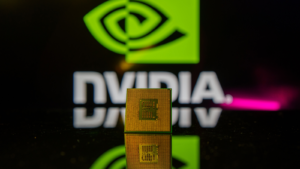
The augmented reality (AR) market is expanding rapidly, set to be worth $50.25 billion in 2024 and expected to expand 35% annually to $570.79 billion by 2032. AR stocks will continue to attract attention due to the astronomical value proposition on offer as the sector grows. Due to U.S. government funding and immersive technology expenditures, North America is expected to dominate the industry.
Companies are increasingly adding AR to a wide range of products and services. As an example, ActiveLook has connected its micro-projection technology to the CrewNerd app so that rowers can see their real-time AR success data. The official AmazeVR Concerts app also launched with a special concert by Zara Larsson, showing how AR can be used in entertainment.
Furthermore, during its Worldwide Developers Conference 2024 event, Apple (NASDAQ:AAPL) recently showed off new features for its Vision Pro AR device. These features could help the gadget become more popular with regular people; Apple thinks that between 500,000 and 600,000 Vision Pros will sell this year.
At the same time, Microsoft (NASDAQ:MSFT) is updating HoloLens with AR functionality and Meta Platforms (NASDAQ:META) continues innovating in AR by overhauling its Quest 3 headset.
The latest industry moves and multi-billion dollar market size will inevitably lead to more investors searching for AR stocks. Itt’s a savvy move, so let’s explore some that are getting plenty of analyst love.
Nvidia (NVDA)

Nvidia (NASDAQ:NVDA), one of the Magnificent Seven equities, is now the most valuable firm in the world after growing 239% in 2023 and 181% this year. NVDA has numerous business lines, including AR.
At Computex 2024, NVDA demonstrated better AR immersion with RTX computers powered by artificial intelligence (AI). With these advancements, developers may leverage Nvidia’s AI-AR technique to create more engaging AR applications.
Nvidia’s Omniverse offers CloudXR virtual reality (VR) add-ons. AR devices provide and receive 3D data and position virtual objects in real life. Professionals may immerse themselves with graphics and industrial AR. Foxconn builds digital twins and improves robotic facilities utilizing Nvidia’s Omniverse, Isaac and Metropolis platforms to further industrial digitalization.
Nvidia’s CloudXR software allows mobile devices to enjoy high-fidelity AR and VR. GPU virtualization and Nvidia RTX servers let CloudXR distribute complex AR applications across 5G and Wi-Fi.
Top PC manufacturers are building AI factories using Nvidia’s MGX flexible reference design tool. Spectrum-X Ethernet improved the AI task network, speeding AI solution processing and delivery. Furthermore, Nvidia microservices improve gene analysis, pictures and surgical robots with AI.
Overall, creative AI applications are simpler to design and utilize with NVIDIA NIM. Building AI applications is simpler with its inference APIs, which execute models effectively in containers, making NVDA one of the best AR stocks out there.
Alphabet (GOOG, GOOGL)

Google’s parent Alphabet (NASDAQ:GOOG, NASDAQ:GOOGL) is coming off substantial momentum in recent months, thanks to declaring its first-ever dividend of 20 cents per share, greenlighting the buyback of an additional $70 billion in stock and posting better-than-expected first-quarter results. All the while it has been pursuing its AR ambitions, making it one of the top stocks in the field.
Alphabet’s interest in AR is not new. It purchased Raxium to improve its AR capabilities and strengthen Google’s market position by integrating advanced display technology with its AR goods and services. In addition, Alphabet is actively working on providing high-fidelity AR experiences across devices for the company. These initiatives enable developers and companies to build more engaging AR applications.
A recent strategic technical alliance between Magic Leap and Google has increased the commercial use of AR solutions based on Magic Leap’s excellent AR technology and Google’s software and cloud services. Google is also experimenting with YouTube’s creative AI, leveraging powerful AI to make videos easier to produce and view. Additionally, AI21 Labs and Google Cloud are adding creative AI tools to BigQuery to accelerate data processing.
Symbotic (SYM)

Symbotic (NASDAQ:SYM), for the first time in a while, is trading at a very attractive valuation after falling 31% this year. Much of that loss came after posting weaker than expected earnings and outlook.
However, investors who are bullish on AR stocks should remember that Symbotic made Fast Company’s list of the 2024 World’s Most Innovative Companies because of how it uses robots and AI in the supply chain. This includes the self-driving SymBot robot, which makes things faster, more flexible and more efficient while also dropping costs. Other features include those that work with AR technology to make logistics processes easier to see and automate.
Symbotic has persisted in growing its alliances, most notably via its joint venture with GreenBox. Although there are a number of risks and uncertainties associated with this project that might affect its performance, the goal is to improve their outsourcing skills.
It’s also worth pointing out that the earnings report that caused SYM to dip did have some notable positive beats, with second-quarter sales increasing to $424 million with adjusted EBITDA of $22 million. In the last four quarters, SYM has surpassed Wall Street estimates three times, cementing its place among top AR stocks.
On the date of publication, Faizan Farooque did not hold (either directly or indirectly) any positions in the securities mentioned in this article. The opinions expressed in this article are those of the writer, subject to the InvestorPlace.com Publishing Guidelines.





